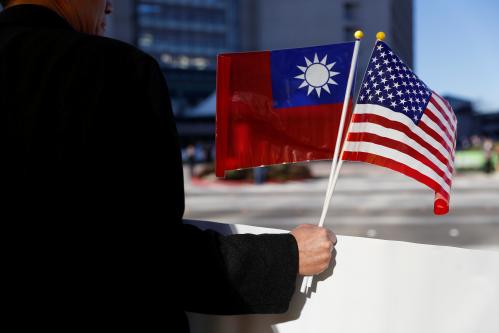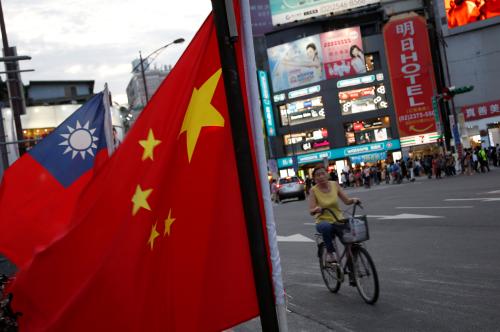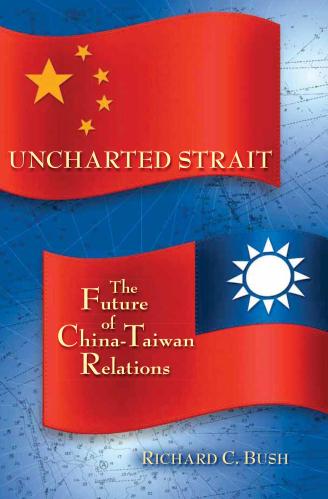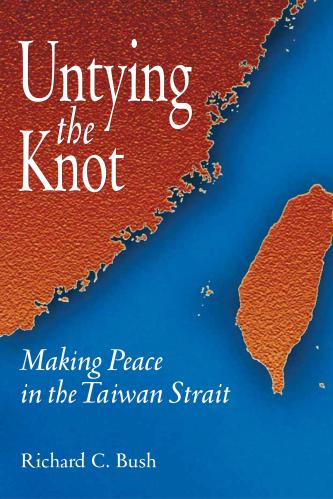Content from the Brookings-Tsinghua Public Policy Center is now archived. Since October 1, 2020, Brookings has maintained a limited partnership with Tsinghua University School of Public Policy and Management that is intended to facilitate jointly organized dialogues, meetings, and/or events.
U.S.-Taiwan relations should not be structured around placing stress on China, but rather around strengthening Taiwan, even as shared values continue to pull both societies together, writes Ryan Hass. This piece originally appeared in the Taipei Times.
While the societal connections between peoples in the United States and Taiwan have been tight and unwavering for decades, the strategic rationale for the relationship has continually evolved based on events.
In the post-World War II period, Taiwan was a strong and reliable bulwark against the spread of communism. Washington was willing to overlook authoritarian aspects of the KMT’s rule during this period, because resisting the spread of communism was a higher strategic imperative. Taiwan was viewed as a committed partner in blunting the spread and attraction of communism.
The end of the Cold War and the transformation of Taiwan’s political system in the 1980s and 1990s opened a new chapter in U.S.-Taiwan relations. American policymakers were no longer preoccupied by concerns of the domino theory of communist expansion. Instead, shared values became a new foundation upon which unofficial relations could be built. Taiwan’s democratic transition provided energy and enthusiasm to relations, coming at a time when hopes were high that the third wave of democracy could spread to all shores, including possibly even mainland China. Taiwan came to be seen in the United States by liberals and conservatives alike as a democratic beacon.
To this day, shared values of democracy, human rights, and rule of law continue to bind people from the United States and Taiwan. However, under President Trump, values promotion has largely receded in prioritization within America’s foreign policy. Even though Vice President Pence and Secretary of State Pompeo remain outspoken in their promotion of values, their advocacy is no substitute for presidential support.
The past two years have laid bare that President Trump is an unconventional leader, unbound by past conventions, unencumbered by ideological pursuits, and less and less constrained by the views of his subordinates. Instead of promoting democracy and encouraging protection of human rights, Trump has been a consistently transactional, interests-based decision-maker.
At the same time that values have receded in President Trump’s foreign policy prioritization, enthusiasm for challenging China has moved to the fore. Great power competition has become the organizing principle of Trump’s foreign policy, and stunting China’s rise has become the preoccupation of strategic planners. Vice President Pence gave clearest expression of Washington’s toughening approach to China in his speech at the Hudson Institute on October 4, 2018.
Meanwhile, Beijing has closed doors to engagement with President Tsai (蔡英文), causing Tsai to look elsewhere for open doors. The Tsai administration has been pursuing a diplomatic diversification strategy, including by seeking deeper ties with the United States.
So, in these changing times, there is risk that confronting China could become a new organizing principle for U.S.-Taiwan relations. That would be a mistake.
U.S.-Taiwan relations should not be structured around placing stress on China, but rather around strengthening Taiwan, even as shared values continue to pull both societies together. U.S. and Taiwan interests are best served by a Taiwan that is prosperous, vibrant, confident in its security, and treated with dignity and respect around the world. This is an affirmative view of the value of U.S.-Taiwan relations on its own merits, rather than as a tool to be wielded in competition with the mainland.
There are practical steps the United States and Taiwan could pursue now in support of such a vision. They could prioritize efforts to increase the attractiveness and competitiveness of Taiwan as an innovative economy and society, including by removing impediments to two-way trade and investment, negotiating a bilateral investment agreement, and expanding joint scientific collaboration on cutting-edge issues, such as cancer research, artificial intelligence, and the internet of things. Both sides also could find creative new ways to garner global goodwill by jointly building capacity for third countries on issues such as pandemic preparedness and green energy development and deployment. As technological leaders, both sides could establish a high-level, interagency U.S.-Taiwan working group for coordinating responses to emerging issues related to cybersecurity, artificial intelligence, and quantum computing. Washington and Taipei could coordinate responses to efforts by Beijing to influence democratic processes abroad, and also share lessons learned with others that similarly are seeking to guard against external interference. And both sides could take further steps to make Taiwan’s self-defense capabilities more innovative and asymmetric.
Such an agenda will seem unsatisfying to individuals in Washington and Taipei who would like to use Washington’s animus toward Beijing as an opportunity to chip away at the unofficial nature of U.S. relations with Taiwan. Proponents of such an approach favor ideas such as U.S. Navy port calls to Taiwan, U.S. military demonstrations of strength in the Taiwan Strait, new precedent-setting protocols for President Tsai’s next transit of the United States, and loosening of restrictions on senior-level visits between the United States and Taiwan. While symbolically satisfying, none of these proposals would make Taiwan safer or more prosperous.
The point is not to give Beijing a vote on the conduct of U.S.-Taiwan relations, but rather to have a clear, shared understanding of what the United States and Taiwan seek to advance through their relationship. A shared affirmative vision for a vibrant, secure, and respected Taiwan will bring about a more productive and enduring relationship than one that is cast in opposition to Beijing.








Commentary
Op-edSearching for the soul of US-Taiwan relations
January 28, 2019